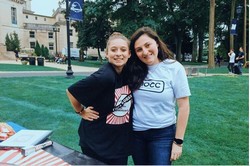Every seat was taken in anticipation of the 2014-15 Visiting Writers Series commencement featuring Assistant Professor of Creative Nonfiction Melissa Febos, last Tuesday, Sept. 16 in Wilson Hall Auditorium.
Melissa Febos is the author of the critically acclaimed memoir, “Whip Smart.” Febos has been featured on NPR’s Fresh Air with Terry Gross, Anderson Cooper Live, CNN, The Atlantic and Tin House online, Guernica, and New York magazine. Additionally, her writing has been published in Glamour, Kenyon Review, Post Road, Salon, New York Times, The Chronicle of Higher Education Review, and more. She received an MFA from Sarah Lawrence College and has taught writing at Purchase College, The New School, NYU, Sarah Lawrence, Utica college, as well as other institutions. Currently, Febos is an Assistant Professor of Creative Nonfiction at Monmouth University.
One hundred and forty-eight students, plus faculty and community members, packed Wilson Hall auditorium for the first of four Visiting Writing Series. “I think this is the first time I’ve seen every seat taken,” said Michael Thomas, Associate Dean for the School of Humanities and Social Sciences. The Visiting Writers Series is hosted by Monmouth University Center for the Arts. The tradition of the opening reader having a connection to MU started with the beginning of the series ten years ago. Melissa Febos’ reading is also part of a yearlong engagment titled “Artful Explorations of Gender,” co-sponsored by MU Center for the Arts, Gender Studies, Student Activities, and Athletics, in which a range of work will examine boundaries of gender, gender inequalities, and the role of art in seeking justice for gender discrimination.
Anthropology Professor Brooke Nappi introduced Febos’ work as an exposure of “secret and intimate worlds that we each occupy, but rarely reveal – desire, pleasure, pain, addiction, secrecy, change.” Professor Nappi continued on to explain how this exposure urges readers to reconnect with their bodies and inner selves to find truth and honesty. In spite of the heavy and sometimes taboo topics that Febos writes about, her work occasionally induces laughter since she believes that every kind of laughter can be factored down to fear.
Febos read a “medley of creative nonfiction,” consisting of excerpts from her memoir, “Whip Smart”, essays, and works in progress. To begin, she read sections from a work in progress titled “The Book of Hours”, introducing the concept of story. She later explained how childhood stories facilitated her literary career. “Stories have always been a kind of home for me, even before I ever wrote them,” said Febos, explaining how she uses them to construct meaning for things that are difficult to understand or accept.
The writing process for “The Book of Hours,” ultimately led Febos to the MU Library’s special collection where she discovered unexpected parallels to her work. “When I trust my impulses and my process, and let myself become curious about my own stories and where they’re going, I find that I have a much more accurate sense of what I’m actually looking for because I don’t always know. I think sometimes we don’t know the things we’re looking for until we find it,” said Febos.
Febos proceeded to explain this notion, saying that the imagination is smarter than the mind.
Dean Thomas commented on this statement, “It is a beautiful thing about the work of the imagination and John Keats, the poet, had this principle called negative capability. Negative capability is this willingness to live in the imagination, a willingness to live in a state of suspension in uncertainty without, as he said, an irritable reaching after for fact and reason. I think if we allow ourselves to live in this suspended state like not always knowing the answer, not always knowing where we’re going, not always knowing the outcome, that we actually experience something greater in our lives.”
An excerpt from her memoir, “Whip Smart”, detailed a dark period during her undergraduate years when she was struggling with addiction and working as a professional dominatrix.
In this reading, Febos focused on the construct of different stories that people build to make meaning of their lives. Sometimes people latch on to “a particular character of ourselves” as a survival mechanism, even though it is not necessarily their truest or best version. The excerpt related to her own experience, specifically the initial stages of her realization that she could not sustain this particular story.
When asked how she found the strength to change her own story from dark times to where she is now, Febos said that she had a dubious gift of her life depending on it. She explained that anticipation is the hardest part about being completely honest with oneself and taking that look in the mirror.
Kevin Holton, a senior English major, said, “I read her book straight through and it’s one of the few I’d read again. Each line is heavy with poetic imagery and dark truths – even the jokes. The way she treats each line is, in a word, incomparable.”
The excerpt from “Whip Smart” also introduced the concept of her name – a word she could whisper to herself and be reminded of everything she has ever been. Subsequently, Febos read an excerpt from an essay titled “Call My Name”. Dean Thomas related Febos’ theme of identity to The Odyssey, explaining that when Odysseus finally reveals himself, claiming his name, he discovers an entirely new voice, understanding, purpose for life, and sense of power.
Next, Febos mentioned that the hardest part about writing nonfiction is handling the lives of others. She has written the least about her younger brother, as it is very important not to hurt him by sharing his story, but a crucial way for her to understand certain events that have transpired in their lives. She read an excerpt from a work in progress, describing a particularly hard summer that ended with her holding up the world for her brother so it would not come crashing down around him.
Another excerpt from “Call My Name” concluded the event. Febos read, “My name is not a symbol, it is coded with all of this including the unseen, the nearknown, and the rather not known. It hurts to hear everything my name holds, but I choose to drink from that river now, to carry that tangled history. I no longer want to change my name, I never did really, I only wanted to know where I ended and everything else began, and I still do.”
The reading was followed by a Q&A session in which Febos advised young writers to stop thinking about being published and think only about writing their own story. To do this, she urges writers to avoid what others may think of their story. “Put in everything that might be important, because if you start censoring what you include in your story before you know what it really is, and you never know what it is until you finish, you might leave out its heart and its lung and you don’t want to do that.”
After the event, Rachel Fox, a senior English education major, said, “Not many people are able to be so completely honest about their past, so it was amazing to see her bravery not only reflected in her writing, but in saying it aloud to a room filled with colleagues and students. As one of her current students, she has inspired me to not be afraid to open up and be more honest in my nonfiction writing.”
The next Visiting Writers Series will feature accomplished writer Joyce Carol Oates on Nov. 13 in Pollak Theatre at 4:30 pm.
PHOTO COURTESY of Kevin Holton



